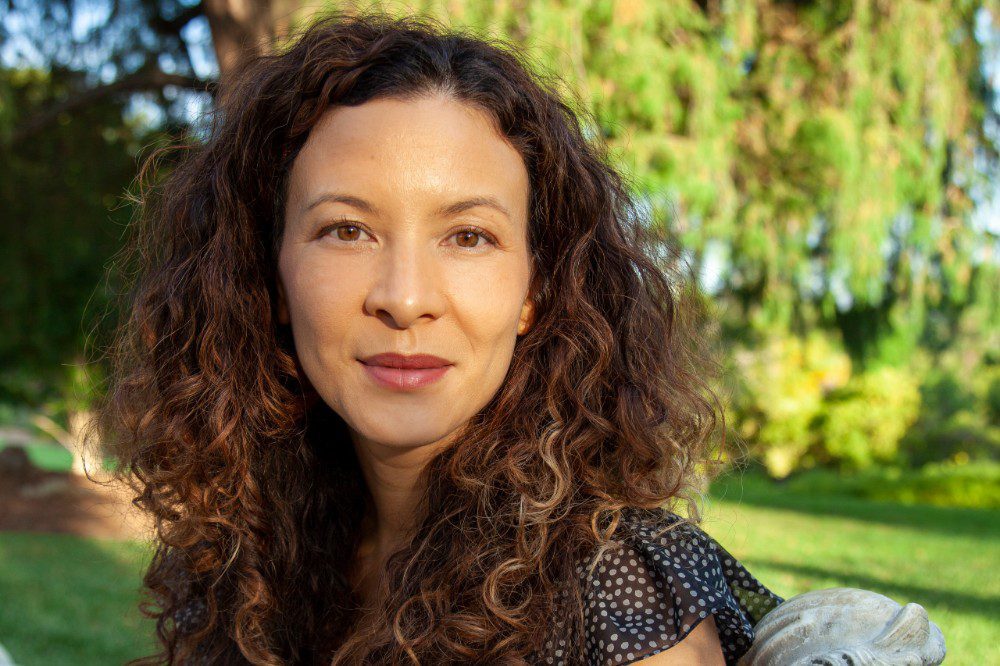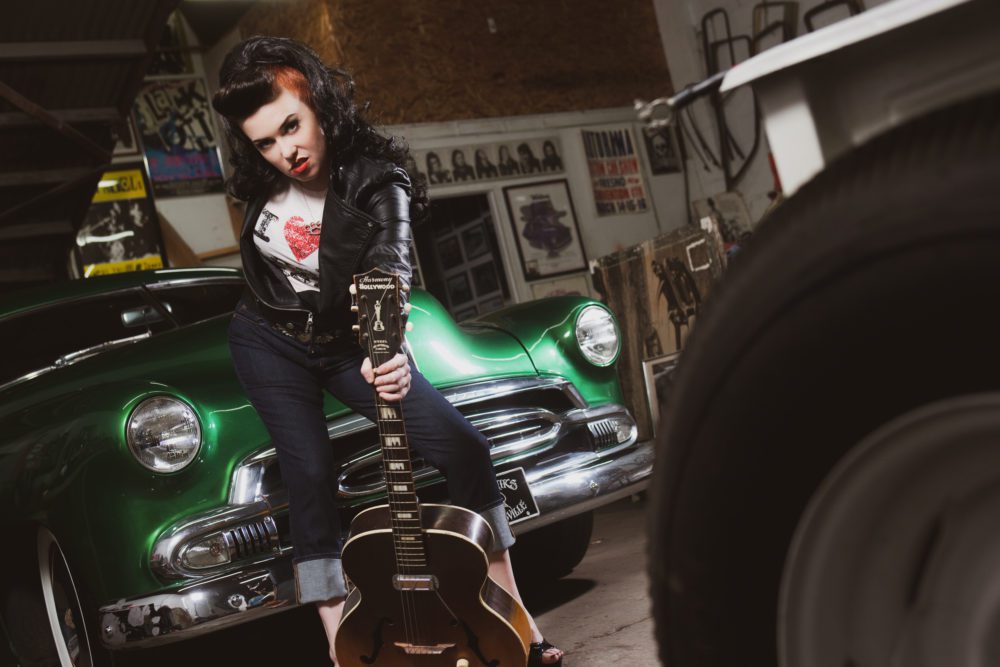

With more than two decades of experience in the industry, Los Angeles folk singer Mia Doi Todd can certainly wax poetic about dedicating her life to music. She dispenses those gems freely on “Music Life,” the title track to her stunning 12th album, depicting the lifestyle as both a blessing and curse: while it “opens up the path” to friendship and collaboration that transcends borders, it can also be a lonely endeavor that fosters self-destructive tendencies. As the track shifts from celebratory to something more like a cautionary tale, the chords darken; these shifts in tone and narrative arc play out again and again over the eight tracks that make up Music Life, Todd’s first collection of original songs since 2011’s Cosmic Ocean Ship.
Motherhood was partly responsible for the slowing of the once prolific musician’s output. “I had the work ethic and drive, but my daughter really didn’t like me to play guitar and hold her. It was like holding another baby – she was jealous of that guitar,” Todd says with a laugh. “She was much less competitive with the piano.” That’s part of the reason so many of the songs on Music Life are piano-driven – and certainly the reason why motherhood emerges as one of the album’s strongest themes.
In the interim, Todd has been navigating the practical side of how to live a music life, becoming adept at making the business of it somewhat sustainable, at least. She’s gradually taken control of all her independently released masters, making licensing that much easier (and more lucrative), and since 2001’s Zeroone has operated her own label, City Zen Records. While she’s produced records with Columbia (2002’s The Golden State) and various indies since founding it, everything she’s put out since 2008’s GEA has been on her own terms. She says this has been invaluable to her creative process, allowing her to take on pet projects like Floresta (an album of Brazilian covers released in 2014), Songbook (her 2016 album of covers revealing surprising influences, from Prince to The Cure to Elliott Smith) and the original soundtrack to Casey Wilder Mott’s 2017 adaptation of A Midsummer Night’s Dream, in which she played Titania alongside Saul Williams’ Oberon.
She’s also co-owner of eclectic Los Angeles venue Zebulon, part of a group responsible for bringing the club’s ethos to the West Coast from its original iteration in Brooklyn. “Because of Zebulon, I started producing shows and putting together bills,” she says. “I’ve very much been like a community organizer in music, so Zebulon opened up even more avenues to bringing together musicians.” Those connections form the backbone of Music Life, and tell Todd’s personal story – if not always obvious in the lyrical details, which borrow from mythology as much as personal experience, then certainly in the album’s guest appearances, which illustrate the rich and beautiful journey Todd has been on.
That journey began in Silver Lake, where Todd grew up – her father is a sculptor, and her mother (who lived in a Japanese internment camp as an infant) was the first female Asian American judge in the United States. A young Mia Doi Todd took lessons from an opera singer neighbor, then attempted to study astronomy and Asian Studies before songwriting for weekly open mic nights and residencies at now-defunct indie club Spaceland possessed her soul. Eventually she landed in a loft space in then-desolate Frogtown known as a reliable spot for touring musicians to crash, where parties and jam sessions could go uninterrupted late into the night. Money Mark, who had a hand in nearly every song on Music Life, also lived in the building.
“He’s like my cousin – for almost 15 years, he’s been a part of our family,” Todd says. “We’ve worked together and played together a lot, but this maybe was the first time he played on something that actually came out. Mark is amazing at making the hook – he did that for Beck and The Beastie Boys. Mark helped set up the studio time where we did the basic tracks for this whole record and a couple extra songs. It was very ambitious, time-wise.”
Recorded over a week-long session at Hollywood’s Barefoot Studios (formerly and perhaps more famously known as Crystal Sounds), Todd played the same grand piano Stevie Wonder recorded on. Instagram posts from that period, before COVID upended the music industry, show Todd laughing and smiling, arms around a cast of dear friends who’ve meant so much to her career and her life, and happen to be some of LA’s most impeccable musicians. Like her relationship with Money Mark, these connections forged over her entire adulthood lend special touches to each of the songs on Music Life.
For instance, “Mohinder and the Maharani” brings together Syrian-Jewish oud/bazuki prodigy Asher Levy (who’s played at Zebulon), drummer Will Logan and Todd’s longtime percussionists Alberto Lopez, Allakoi Peete, and Andres Renteria; Money Mark not only plays keys, but arranged the bright Middle Eastern horn section led by Tracy Wannomae, with Sam Gendel on saxophone, Sean Okaguchi on trumpet, and Jon Hatamiya on trombone.
In fact, the brass and woodwind sounds throughout the album are incredibly diverse, adding an incredible variety to the songs. On “Take Me To the Mountain,” a soaring lament for city dwellers that picks up where “All My City” leaves off, Wannomae’s flute flutters woozily over the whole composition; the orchestral arrangements lend a mystical power across nearly ten plus minutes on “Daughter of Hope.”
Notably, many of the album’s most prominent players are of Japanese descent, like Todd herself. “You don’t think of Japanese Americans as being musicians – Asians get stereotyped for being mathematicians, or doctors,” she says. “I really wanted to show the beautiful faces of these Japanese American musicians playing the songs.” Perhaps most poignant of these was non-album stand-alone single “Take What You Can Carry,” released last year but recorded in the same session. While the song centers the experiences of Todd’s family during World War II, it also hints at the plight of Central American immigrants caught up in the border crisis, the panic of the California fires, and backlash toward Muslim Americans in the aftermath of 9/11.
Todd is particularly adept at transforming trauma into triumph; on Music Life track “Little Bird,” a breezy samba overtone – leant some Brazilian authenticity by Fabiano do Nascimento’s nylon guitar and feathery strings courtesy Miguel Atwood-Ferguson – belie darker themes of escaping childhood abuse. Lines like “Martyr, you suffered more than your share/Your mother, said he wouldn’t dare/Doors closed; it happened all the time” are juxtaposed with carefree responses like “Why not go live in London?/Go out and see the world! Come on, you’ve never left LA!” and “Little Bird, our nest was all broken/But spread your wings and know that you can fly!” Todd says the light-hearted samba represents “the feeling that on the surface everything’s okay… you’re managing, you’re keeping it light, you’ve got it under control. But then underneath and in the belly of the song there’s this change, and that’s the secret hidden in the song.”
She says that watching her daughter grow up, and wanting to protect her, has made her reflect on memories she’d buried within. “You reconsider all the stuff that happened when you were young,” she says. “My daughter is closer now to the age I was when I started songwriting, so I see everything through a different lens. You see how things that happen in your youth have such a long-term effect.”
“Daughter of Hope” ends the record with the a promise – Todd traverses an ocean of tears, pain, fear, life, death, time, and breath, layered with swooning strings and choral vocal rhythms almost reminiscent of the techniques pregnant women learn in Lamaze class. “I haven’t done that on many of my records – I usually just concentrate on the lead vocal. But some of this Steve Reichian [repetition], I’m into that,” Todd says. “Live, it is a Herculean effort vocally to get through that song – there’s hardly a place to breathe, it just keeps going and going. It was such an ode to my daughter, and all my hopes, really acknowledging limitations. That one was so epic – I wrote such a long song and I just could not edit out any of the words. I had a lot to say!”
Todd says she got in the habit of writing longer compositions when she was studying abroad in Japan during her college years. “I didn’t have much outlet for English language conversation so I made a lot of really long songs. It developed my style a lot, ’cause I was in such a vacuum,” Todd remembers. “Being in this last ten years of motherhood and [having] a big shift in my life, there’s something that called me back to those early years of myself, and [this album] was kind of a return [to] some of the long songwriting that I did in my early work.”
She recently experimented with a similar style of vocal layering on a remix of Laraaji’s “Ocean Flow Zither.” Todd became acquainted with the ambient legend as his rediscovery by industry tastemakers led to multiple California tours. He and his partner “prefer to stay in a cozy family environment,” says Todd, so a mutual friend introduced them; the couple eventually became godparents to Todd’s daughter. “They just came to stay with us over and over again on their tours, and I had a bunch of events here introducing him to young musicians, and having jam sessions in the studio, him playing the piano and singing for everybody,” she says fondly. Laraaji had a chance to return the favor by playing zither on “Waniha Valley,” the oldest of Todd’s songs on Music Life, written when he daughter was still an infant.
“Laraaji was coming through and we were trying to figure out what which song might be in the key of his zither – he has to tune it up to a certain key and doesn’t want to detune it too much on tour, it takes a long time to tune it. That’s the most ethereal track on the album, so that one was perfect for the zither,” Todd says. “I remember writing that song on the ukulele – I had like half of an hour where [my daughter] was taking a nap. I remember singing to the waves, just working it out.”
Soon after, she wrote “My Fisherman,” based on Brazilian writer Jorge Amado’s novel Sea of Death. In the song, she takes on the persona of Yoruba ocean deity Yemanjá, who has been an ongoing muse. Both “Waniha Valley” and “My Fisherman” retain Todd’s folkloric sonic sensibilities. But Todd’s attraction to mythologies from all cultures – referenced quite clearly in the cover art for Music Life, a self-portrait of Todd rendered in Grecian amphora style – isn’t just about storytelling. “I always just have this in my framework, that we’re living these archetypes, they’re operating around us,” she explains. She says she’s drawn to the way Ancient Greeks viewed music and dance not as entertainment, but as spiritual practice. “I can see the greater things in motion, even though I live a very mundane, simple life. I like to feel connected to the spiritual world and the ancient world, and we’re not so far from that in the great scheme of things.”
Todd’s next burst of creativity came when her daughter entered kindergarten, attending the same school as Tortoise alum Jeff Parker’s daughter; he also plays on Music Life, his jazzy guitar unravelling through the title track. Another significant contribution came from Brandon Owens, who plays bass throughout the record; “Music Life” was partly inspired by the untimely death of Owens’ brother, Mars Volta keyboardist Ikey Owens, “so it was nice to have Ikey’s brother Brandon playing bass on the track,” Todd says.
But perhaps the most significant of Todd’s contributors is her husband, Jesse Peterson, who plays guitar on the songs and painstakingly co-produced the album in their home studio, a converted two-car garage. “We did a lot of the other overdubs here at home. This is probably one of the more orchestrated albums I’ve made,” Todd says. “You do a bunch of passes [in the recording session] and then you have to go back and find the little bits and edit them all together into a seamless, natural sequence, so that takes a long time. I did some of the editing; one thing I learned in those early producing sessions was that you have to edit what you do before you start recording the next instrument, so you can base one decision off of the last. If you wait to sort it out at the end it’s just a mess. You really need to have some arc in mind; it doesn’t just magically fall into place. [It] took a lot of crafting, and that was on my husband’s part. He is very good at that – I don’t like mixing.”
The ability to fit everything together like a puzzle, to envision that narrative arc – these are strengths than not only inform Music Life, but the principals by which Mia Doi Todd has operated in LA these last few decades. Like the remix album that followed 2005 LP Manzanita – remarkably featuring the inaugural track from none other than a young Flying Lotus – Todd’s planning a remix album for Music Life for later this year. “That’s another way that I’ve collaborated, where I do my part first and then somebody else takes it in a totally different direction, making an entirely new environment for it,” she says. No matter what shape her collaborations take, she says they always help her get outside her songwriting structure and explore.
“I have these tiny hands and I don’t have a lot of actual formal music training on the piano or the guitar – I feel my musical limitations. So working with other people breaks those down and there’s all different sorts of possibilities. It just opens up so much,” she says. “I really like getting outside of my genre, so if I’m invited to sing on like, some hip-hop song I embrace the chance. I’m thought of very much like a songwriter folk artist, but in an improvising, kind of casual jam sessions type of musical sense, I’m very open – that is where I feel most comfortable, really. Collaboration is just so natural among musicians, and I relish that.” She says she’d love to make a reggae record, and even covers Gregory Issacs classic “If I Don’t Have You” on Music Life, her way of adding one “true love song” to the album.
While she says that her folky path has, in many ways, given her a long-term viability that many pop artists don’t have, she’s come to appreciate the songcraft of her daughter’s personal favorite: Taylor Swift. “I’m not a pop music person but I can really appreciate Taylor Swift’s songwriting, and I appreciate the genius of a pop hit. I’ve never listened to as much pop music as I have the last two years,” she laughs, noting that she thinks the closest she’s personally come to writing something perfect is “Summer Lover.”
“Music Life” ought to be a close second though, and it’s resonated with many of her peers. “It definitely captures some feeling about being so grateful for this rich life that we have – it’s like living with the sacred, but there are a lot of sacrifices,” Todd says. “I don’t really encourage my daughter to take up the artist life. For me, I think there was not so much alternative. So if you can do anything else, I think it’s a wise choice. But if you cannot, like, the urge is just all-powerful, then you’ve got to try and answer the call. And I’m glad I did; I’m in it for the long haul… I feel like I keep growing. It’s a path. And I have all these things to show for the path along the way.”
Follow Mia Doi Todd on Instagram for ongoing updates.




